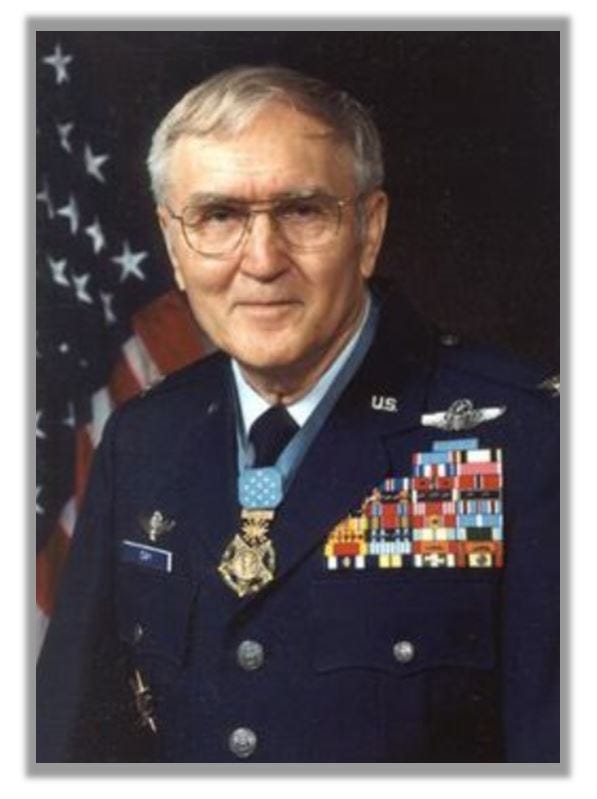Medal of Honor Monday: George “Bud” Day
One phrase kept him going: “Return with Honor.” For more than 5 years, Day persevered, never giving any useful information to the enemy.
At about this time in 1925, a hero is born. George “Bud” Day served in World War II, the Korean War, and the Vietnam War. He served as a Marine, a soldier, and an Air Force pilot. He remains one of America’s most highly decorated officers.
He is also a recipient of the Medal of Honor, awarded for his bravery as a prisoner of war in Vietnam.
When Day was captured, he was a 42-year-old Air Force Major and the commander of a squadron of F-100s known as the Misty forward air controllers. A mission on August 26, 1967, would change Day’s life.
“It was a really hairy mission,” he later described, “because you spent a lot of hours, a lot of time, fairly low to the ground at high speed getting shot at. And so I lost 42 percent of my airplanes in the first six months we operated. And I was one of those, I might add.”
Day was in tough shape when he hit the ground. His arm was broken. His back was injured. He’d dislocated a knee. As if that weren’t enough, he’d temporarily lost sight in one eye.
“I hit the ground real hard,” Day said, “and when I woke up, they had me.”
He was tortured for five days before he managed to escape. For two weeks, Day survived in the jungle, eating berries and frogs. He was nearly rescued one day when he saw Marine helicopters evacuating people in the distance. He hobbled towards them as fast as he could, yelling for the Americans to wait.
But they couldn’t hear him. They left, never realizing that Day was so close.
Day was recaptured and taken to the Hanoi Hilton. By then, he had new injuries. He was “totally debilitated,” according to his citation, “and unable to perform even the simplest task for himself.”
Naturally, he offered “maximum resistance” to his Vietnamese captors anyway. They rewarded his “bad attitude” with more torture.
“I had some absolutely brutal torture sessions,” Day later said. “Two or three times, frankly, I would have preferred to die as to continue that. I had one session where I took 300 strokes of a fan belt. I was in leg irons and they were beating me . . . . I can remember counting ‘til 300 strokes and I just said, ‘why am I wasting my time counting here? They are going to kill me.’”
One phrase kept him going: “Return with Honor.” For more than 5 years, Day persevered, never giving any useful information to the enemy.
His leadership kept up the morale of others in captivity.
On one memorable occasion, Americans were caught holding a forbidden religious service. The Vietnamese pointed a rifle in Day’s face, but Day pointedly stared it down and began singing the Star-Spangled Banner.
Soon, all our boys were singing.
Not long after Day arrived at the Hanoi Hilton, a badly injured John McCain was tossed into his cell. “I was stunned by his condition,” Day said. “My first thought was: They dumped him on me so they can claim we let him die.”
Miraculously, both men survived, and Day and McCain were released together in March 1973. Day had been promoted to Colonel during his years in captivity.
Day later spoke humbly of his experience, as so many Medal recipients do.
“We’ve been so fortunate by the accident of birth to be Americans,” he concluded. “And, having had that good fortune, our primary duty is to make sure that this country survives and that we stay free. That ought to be the primary objective of every American, every day, for the rest of their life.”
Day passed away in 2013, but he’s since been posthumously promoted to Brigadier General. Rest in peace, sir.
Sources can always be found on my website, here.





“We’ve been so fortunate by the accident of birth to be Americans,” he concluded. “And, having had that good fortune, our primary duty is to make sure that this country survives and that we stay free. That ought to be the primary objective of every American, every day, for the rest of their life.”
This is the history our young people need to learn. Not that war is Grand, but that freedom isn't free and how to act with honor when things are tough.